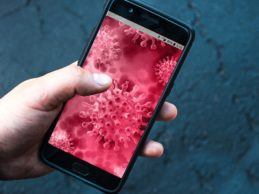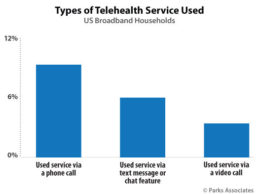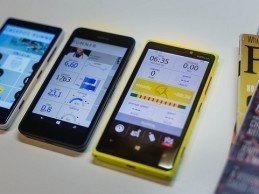Over 50% of US broadband households are willing to share smartphone data to aid in COVID-19 contact tracing, while another 20% could be convinced provided privacy protections are in place, according to Parks Associates' new research, COVID-19: Impact on Telehealth Use and Perspectives. The research tracks changes in consumer attitudes and adoption of telehealth services as a result of COVID-19 and measure future interest in telehealth services beyond the pandemic.
Parks Associates' COVID-19:
Read More
Parks Associates
Only 15% of US Consumers Used A Telecare Service in Past 12 Months
As consumers integrate connected devices and services ever more deeply into their lifestyles, they bring the same expectation and desire to their health and wellbeing. New research from Parks Associates reveals 15% of US broadband households have used a telecare service in the past 12 months. The new report quantifies the adoption and use of consumer wearables and other connected fitness devices and evaluates consumer usage patterns and desire for new features.It also examines the growing
Read More
Parks Associates: 42% of Consumers Aged 24-34 Own A Connected Health Device
37% of consumers aged 18-24 own a connected health device, while 42% of consumers aged 24-34 own one, according to research from Parks Associates. Among consumers 65 and older, 31% own a connected health device. The report, 360 View Update: Shopping For Care: Insights from Consumers reveals connected health device ownership (including digital fitness trackers, networked weight scales, connected treadmills, and blood pressure meters) has risen from 24% to 33% of U.S. broadband households between
Read More
Connected Health Business Models for Smart Home Platform Players
Editor's Note: Harry Wang is the Director of Health & Mobile Product Research at Parks Associates. He is also the founder and lead analyst of Parks Associates’ digital health research program since its inception in 2006.
The smart home industry focuses on consumer use cases that charge a recurring monthly fee as the default revenue model for service providers. Equipment manufacturers usually earn revenues from product sales. Smart home platform providers can offer a
Read More
60M Households Will Own at Least 1 Fitness Tracker by 2019
60 million U.S. households will own at least one connected fitness tracker by 2019, according to new report from recently released research from Parks Associates.
"Standards-based connectivity technologies such as Bluetooth/Bluetooth Smart have been key enablers for wearable mobile device platforms such as fitness trackers and smart watches," Mehta said. "These new device platforms are leveraging Bluetooth connectivity to open up a range of applications and use cases ranging from fitness and
Read More
Parks Associates: 5% of Households Use A Smart Watch for Health
5 percent of U.S. broadband households use a smart watch with health and fitness tracking functions, while 8 percent use a digital pedometer or fitness/activity tracker, according to market research firm Parks Associates. The findings reflects Parks Associates previous reports from last summer that finds only 4 percent of U.S. broadband households plan to purchase a smart watch in 2014, up only 2 percent from 2013.
Despite the upcoming launch of the Apple Watch, the smart watch adoption will
Read More
Study: 41% of Home Caregivers Use A Digital Health Device
41 percent of caregivers in U.S. broadband households currently use a digital health device as part of their caregiving routine, including 8 percent who use online tools to coordinate their efforts, according to recent research from Parks Associates.
The research firm's latest report, 360 View: Health Devices and Services for Connected Consumers 2014 analyzes multiple consumer surveys, including a 2Q 2014 survey of 10,000 U.S. broadband households, to analyze consumer health and
Read More
Connected Digital Fitness Trackers Will Top 22 Million in 2014
The number of connected digital fitness trackers sold worldwide rose from 6.6 million in 2012 to 13.6 million in 2013 and will double again in 2014 to exceed 22 million, according to new digital health research from Parks Associates.
Read More







